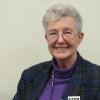Trafficking victims live among us. They may grow our food, make our clothes, serve us in a restaurant, do our hair or nails, or build our electronic devices.
Trafficking occurs in every state in every nation. The number of networks of sisters working against trafficking around the world is an impressive force, but the problem of trafficking is getting worse: In the United States alone, there was a 35 percent increase in sex trafficking reported in 2016, according to Polaris, while labor trafficking reports rose by 47 percent.
Catholic sisters all over the world have been increasing their efforts to fight trafficking. One effective anti-trafficking group is the U.S. Catholic Sisters Against Human Trafficking (USCSAHT). It was my good fortune to be a charter member of the first board of directors, since I was doing anti-trafficking advocacy at the United Nations at the time.
The 15 sisters on the board are from different congregations and from all over the country, but they do have one thing in common: They are engaged in a wide variety of ministries that involve work against human trafficking.
Some of the board members offer services for survivors of trafficking: rescue, protection, education, rehabilitation. Others create newsletters, maintain websites, act as the justice representative for their congregations, or do advocacy in Washington, D.C., in their state capitals, or with local officials. All have created prayer services and educational resources for their congregations or other organizations they belong to; many of these resources and prayer services can be found on the organization's website.
The organization was legally incorporated within the past year, so the original informal board is now the first official board. We met Oct. 8-10 at the Washington Retreat Center, a ministry of the Franciscan Sisters of the Atonement. The meeting was devoted to planning, capacity-building and setting the vision for the next three years in leadership, membership, program and services.
The second night of the meeting, we board members gathered in front of the White House for a prayer service. Holding candles and posters, we prayed for homeless youth. (In March, a month after vowing to end human trafficking, President Donald Trump proposed through his budget to eliminate the Interagency Council on Homelessness.) We also prayed for people on the move, especially the 22 million refugees. The president wants to wall them out, deport them, ban then and turn them away.
As we prayed, other people would slip in, indicating their support by whispered word or expression. A Hasidic Jewish family, a tourist couple and several others hovered quietly around the edges of our group. An evangelical minister walked into the middle of the circle and with extravagant gestures to heaven loudly called down the blessing of God, to which we all enthusiastically agreed, "Amen!"
Many religious congregations, individuals and coalitions are members of our anti-trafficking coalition, but everyone has access to anti-trafficking resources on the website: curriculum, teaching modules, faith resources, newsletters, video, information about slave-free goods and services, and suggested actions.
Besides providing a networking tool for members and a source of education for everyone, U.S. Catholic Sisters Against Human Trafficking was founded to be the official U.S. representative of a global network of sisters working against human trafficking. The global umbrella group, Talitha Kum (from Jesus' Aramaic words, "little girl, get up"), works with its director and with national and regional coalitions of sisters around the world that are engaged in anti-trafficking work.
The U.S. Conference of Catholic Bishops recently mentioned our group in its anti-trafficking newsletter, noting, "U.S. Catholic Sisters Against Human Trafficking utilizes social media to showcase positive efforts and victories of women and men working tirelessly to combat trafficking."
Work against trafficking is not a single-issue ministry for the sisters, as trafficking has many root causes:
- Poverty and lack of decent work drive men and women to seek work to support themselves and their families. Desperate parents may sell their children. Most trafficked people work in commercial sex trades or forced labor. They are also exploited through involuntary domestic servitude, bonded or debt labor, child soldiering, begging, crimes, forced marriage and organ removal.
- Migration puts refugees and other people on the move into harm's way, making them vulnerable to traffickers. According to the United Nations refugee agency, UNHCR, there are more than 65 million people currently displaced worldwide, more than at any time since World War II.
- Political upheaval is a major cause of forced migration as desperate people flee from persecution or violence. Trafficking is the end result of complex interconnected social factors.
- Climate change disasters and other natural disasters can be causal factors for all the issues above, increasing poverty, migration and political instability.
The logo of the U.S. Catholic Sisters Against Human Trafficking is particularly apt: It shows a green shoot growing out of the darkness from behind prison bars. It is coming out crooked at first, but as it leaves the cage, it straightens and grows up toward the light. All sisters who have worked with survivors of trafficking can see the victims' journey in that little shoot. We are all doing what we can to light up the darkness and take away the bars.
[Ursuline Sr. Michele Morek is Global Sisters Report's liaison to sisters in North America. Her email address is mmorek@ncronline.org.]



